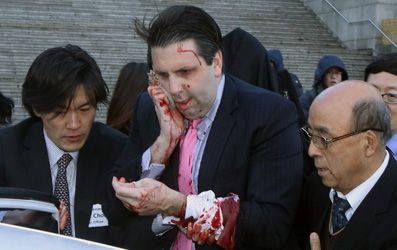BLOODY ATTACK: US ambassador to South Korea injured in slashing
 The U.S. ambassador to South Korea was slashed by a man screaming about Korean unification Thursday morning in Seoul, and his assailant was immediately detained.
The U.S. ambassador to South Korea was slashed by a man screaming about Korean unification Thursday morning in Seoul, and his assailant was immediately detained.
Mark W. Lippert was rushed to a nearby hospital with cuts to his face and wrist, the South Korean news agency Yonhap reported, and appeared to be splattered with blood but was on his feet, TV images show. He was on his way to attend a morning lecture in central Seoul when the attack took place shortly before 8 a.m.
The U.S. Embassy said Lippert was in stable condition after surgery at a Seoul hospital.
YTN TV reported that the suspect — identified by police as 55-year-old Kim Ki-jong — screamed during the attack, “South and North Korea should be reunified.”
Yonhap TV showed men in suits and ties piled on top of the attacker, who was dressed in a modern version of the traditional Korean hanbok, and Lippert later being rushed to a police car with a handkerchief pressed to his cheek. The suspect also shouted anti-war slogans after he was detained, police said.
It was not immediately clear what weapon was used in the attack. An earlier report said it was a razor, but a witness told YTN that a knife was used. Yonhap added that it was the first time a U.S. ambassador has been assaulted in South Korea.
We strongly condemn this act of violence against Ambassador @mwlippert.
— Marie Harf (@marieharf) March 5, 2015
 A National Security Council spokesman said President Obama called Lippert after the attack to offer his thoughts for a speedy recovery.
A National Security Council spokesman said President Obama called Lippert after the attack to offer his thoughts for a speedy recovery.
A police official, speaking on condition of anonymity because the investigation was still happening, said the suspect in 2010 threw a piece of concrete at the Japanese ambassador in Seoul. South Korean media reported that in August 2010 that Kim Ki-jong was sentenced to a three-year suspended prison term over the attack. Kim, who was protesting Japan’s claim to small disputed islands that are occupied by South Korea, missed the ambassador with the concrete and hit his secretary instead, the reports said.
The attacker’s reported comments Thursday on Korean reunification are likely linked to lingering, deep divisions in South Korea that stem from the 1950-53 Korean War. The rival Koreas have been divided for decades along the world’s most heavily armed border. The U.S., which backed South Korea during the war against China-backed Pyongyang, still stations 28,500 troops in South Korea as a deterrent against North Korea, and some South Koreans see the U.S. presence as a barrier toward a reunified Korea — a view North Korea’s propaganda machine regularly pushes in state media.
Thoughts are w/@mwlippert & his family after today’s senseless attack. Grateful to people of #Korea for their care for him & well wishes.
— John Kerry (@JohnKerry) March 5, 2015
Anti-U.S. protesters in Seoul have recently been demonstrating to voice opposition to annual U.S.-South Korean military exercises that North Korea says are preparation for an invasion. Seoul and Washington say the drills, which will run until the end of April, are defensive and routine.
North Korea each year reacts with fury to the drills, which the impoverished country is forced to respond to with drills and weapons tests of its own. In 2013 it threatened nuclear strikes on Washington and Seoul, and on the first day of this year’s drills, Monday, it test-fired short range missiles in a demonstration of anger.
Lippert, 42, was confirmed as the ambassador in September, and has been mostly popular during his time in Seoul. His wife gave birth here and the couple gave their son a Korean middle name.
He previously held senior positions in the Department of Defense between 2012 and 2014 before being nominated to the post. Lippert was formerly the U.S. sssistant secretary of defense for asian affairs and a foreign policy aide to Obama when Obama was a U.S. senator.
http://www.foxnews.com/world/2015/03/04/us-ambassador-to-south-korea-injured-in-attack/

Someday the North will take over all Korea–not by conquering it, but by poisoning the minds of the South through cultural Bolshevism the way it happened in the USA.